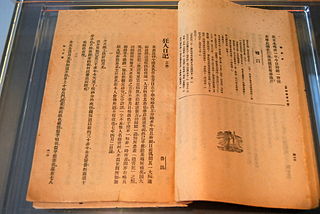Related Research Articles

Zhou Shuren, known by his pen name Lu Xun, was a Chinese writer, literary critic, lecturer, and state servant. He was a leading figure of modern Chinese literature. Writing in vernacular Chinese and classical Chinese, he was a short story writer, editor, translator, literary critic, essayist, poet, and designer. In the 1930s, he became the titular head of the League of Left-Wing Writers in Shanghai during republican-era China (1912–1949).

New Youth was a Chinese literary magazine founded by Chen Duxiu and published between 1915 and 1926. It strongly influenced both the New Culture Movement and the later May Fourth Movement.
Diary of a Madman may refer to:

The China Theatre Plum Blossom Award, more commonly the Plum Blossom Award, is the highest theatrical award in China. It is awarded by the China Theatre Association.

"Diary of a Madman", also translated as "A Madman's Diary" is a short story by the Chinese writer Lu Xun, published in 1918. It was the first and one of the most influential works written in vernacular Chinese in Republican era China, and would become a cornerstone of the New Culture Movement. Lu Xun's stories often critiqued early 20th century Chinese society, and "Diary of a Madman" established a new language and revolutionary figure of Chinese literature, an attempt to challenge conventional thinking and traditional understanding.

Romance of the Three Kingdoms is a Chinese television series adapted from the classical 14th century novel of the same title by Luo Guanzhong. The series was produced by China Central Television (CCTV) and was first aired on the network in 1994. It spanned a total of 84 episodes, each approximately 45 minutes long. One of the most expensive television series produced at the time, the project was completed over four years and involved over 400,000 cast and crew members, including divisions of the People's Liberation Army from the Beijing, Nanjing and Chengdu military regions. Some of the dialogues spoken by characters were adapted directly from the novel. Extensive battle scenes, such as the battles of Guandu, Red Cliffs and Xiaoting, were also live-acted.
Yu Pingbo, original name Yu Mingheng (俞銘衡) and courtesy name Pingbo (平伯), was a Chinese essayist, poet, historian, redologist, and literary critic.
Guo Wenjing is a Chinese composer and educator.

Three Kingdoms is a 2010 Chinese television series based on the events in the late Eastern Han dynasty and the Three Kingdoms period. The plot is adapted from the 14th century historical novel Romance of the Three Kingdoms and other stories about the Three Kingdoms period. Directed by Gao Xixi, the series had a budget of over 160 million RMB and took five years of pre-production work. Shooting of the series commenced in October 2008, and it was released in China in May 2010.
Selected Stories of Lu Hsun is a collection of English translations of major stories of the Chinese author Lu Xun translated by Yang Hsien-yi and Gladys Yang and first published in 1960 by the Foreign Languages Press in Beijing. This book was republished in 2007 by the Foreign Languages Press with the updated title of Lu Xun Selected Works. Stories included in the collection are drawn from three of Lu Xun's story collections: 《吶喊》Call to Arms (CTA), 《彷徨》 "Wandering" (W), and 《故事新編》 "Old Tales Retold" (OTR).

Vladimir Aleksandrovich Kobekin is a Russian composer best known for his opera compositions.
Xu Ying is a Chinese librettist.

The Taiping Heavenly Kingdom is a Chinese television series based on the events of the Taiping Rebellion and the rise and fall of the Taiping Heavenly Kingdom in the late Qing dynasty. The 48-episode series was first broadcast on CCTV in China in 2000. The series was also broadcast on STAR Chinese Channel in Taiwan and on ATV in Hong Kong.
Chinese contemporary classical opera is a musical art form drawing on western opera traditions - distinct from modern developments of traditional Chinese opera.
Poet Li Bai is a Chinese-language chamber opera by Guo Wenjing to a libretto by Diana Liao (廖端丽) and Xu Ying (徐瑛) on the subject of the poet Li Bai. It was premiered, with subtitles, 7 July 2007 at the Central City Opera House, Central City, Colorado, directed by Lin Zhaohua, conducted by Ed Spanjaard, and produced by Martha Liao. Subsequently, the opera was performed in Beijing and Hong Kong
Chen Zi was a Chinese composer. He was one of the composers at the original revolutionary Lu Xun Academy in Yan'an and one of the collaborators assisting Ma Ke in composition of 1945's The White-Haired Girl. Among his works are the 1954 opera Liu Hulan (opera), and the 1956 opera Spring Blossoms co-composed with Liang Kexiang to a libretto by Lu Cang (陆苍) and Wang Lie (王烈).
Mr. Lu Xun by Zhang Dinghuang was the first comprehensive critique of Lu Xun's writings, published in Contemporary Review. Zhang (1895–1986) was an influential writer, translator and reviewer in the vernacular Chinese literature movement of the 1920s and 1930s.

Su Dongpo is a 2012 Chinese historical TV series produced by China Central Television. It was first shown in 2012, although it was filmed in 2007.
Chi-chen Wang was a Chinese-born American literary scholar and translator. He taught as a professor at Columbia University from 1929 until his retirement in 1965.
The Diary of a Madman is a one-act chamber opera by the composer Humphrey Searle, who also wrote the libretto based on the eponymous short story by Nikolai Gogol. The opera was premiered in 1958 in Berlin.
References
- ↑ The Oxford Dictionary of Musical Works - Page 181 Alison Latham - 2004 "Wolf Cub Village. Chamber opera in four scenes by Guo Wenjing to a libretto by Zeng Li and the composer after Lu Xun's story Kuangren riji ('Diary of a Madman', 1918) (Beijing, 1994)."